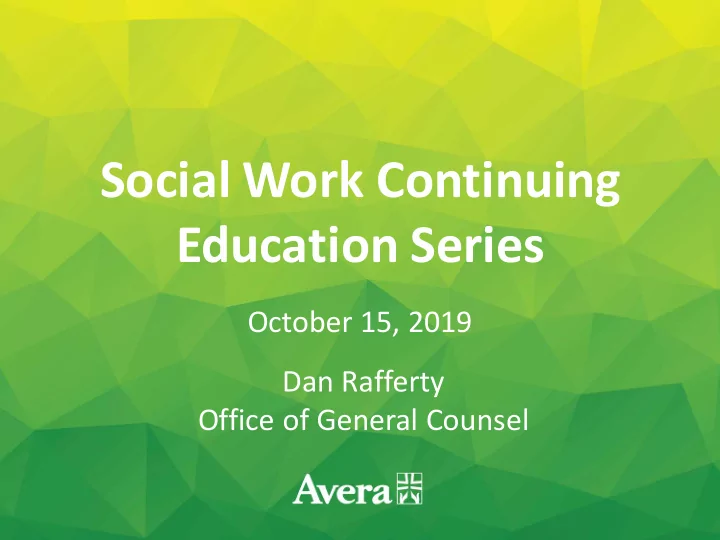

Social Work Continuing Education Series October 15, 2019 Dan Rafferty Office of General Counsel
Topics • When a resident is unable to give consent? • What are the proper steps when initiating a Durable Power of Attorney for Healthcare (DPOAH)? • What are the provision in state law when there is no advanced directive in place and the resident is unable to make decisions?
Decision-making Capacity • 34-12H-1. Definitions. Terms used in this chapter mean: – (3) "Decision-making capacity," a patient's ability to understand to a reasonable extent the nature of and the significant benefits, risks and alternatives to any proposed health care and to make and communicate, with reasonable accommodation when necessary, a decision regarding the health care.
Who Decides Decision-making Capacity • The attending provider determines the patient’s decision-making capacity. • The attending provider may ask for consults; however, the final decision is the attending provider’s. • Care team has pivotal role in relaying concerns to attending provider to conduct assessments.
Limitations on Determination • After attending provider determines a patient’s decision-making capacity, only heath care decisions are affected. • The determination of lacking decision- making capacity DOES NOT: – Allow family members to access bank accounts; – Allow family members to acquire or sell property; or – Create a guardianship for the patient.
Proper Steps for Initiating a DPOAH • Make sure there are no questions about the patient’s decision-making capacity. – No one can execute a DPOAH on behalf of someone else. – If decision-making capacity is in question, DO NOT initiate DPOAH. • Follow your facility’s policy regarding advance directives.
DPOAH Considerations • Use any facility-approved guides to walk the patient through the different decisions that need to be made (e.g., Personal Choices). • Be aware of the signature requirements for your state. – Use the state forms approved at your facility. – Do not provide advice on other forms brought to the facility by the patient/family. – This is the one document a facility notary may notarize. NO OTHER DOCUMENTS SHOULD BE NOTARIZED OR WITNESSED!!!!!
Iowa Considerations • A treating healthcare provider cannot be named as the patient’s surrogate. • A non-relative employee of the treating healthcare provider or the facility where a patient receives care cannot be named as the patient’s surrogate.
Nebraska Considerations • A treating healthcare provider cannot be named as the patient’s surrogate. • A non-relative employee of the treating healthcare provider or the facility where a patient receives care cannot be named as the patient’s surrogate. • A non-relative owner or operator of a community care facility where the patient or resident is receiving care cannot be named as the patient’s surrogate.
Minnesota Considerations • A treating healthcare provider cannot be named as the patient’s surrogate. • A non-relative employee of the treating healthcare provider or the facility where a patient receives care cannot be named as the patient’s surrogate. • The agent named in the document cannot be a witness to the HCPOA. • At least one witness must NOT be an employee of the healthcare provider.
No Advance Directive • SD Healthcare Consent Act – SDCL ch. 34- 12C. – Attending provider determines patient lacks decision-making capacity; preference is to have that noted in the chart. – All types of decisions can be made regarding any treatment, service or procedure to maintain, diagnose or treat a person’s physical or mental condition; including admission to, and personal and custodial care provided by a licensed healthcare facility.
Health Care Consent Act - SD • Guidelines for Decision-makers: – Follow express wishes of patient, if known. – Exercise authority in best interest of the patient. – Consider the recommendation of the attending provider.
Health Care Consent Act – SD • If available to consent, the following family members, in the order stated shall consent: – Spouse, if not legally separated; – Adult child; – Parent; – Adult Sibling; – Grandparent or adult grandchild; – Adult aunt or uncles, adult cousin, or adult niece or nephew; or – Close friend.
No Advance Directive – Iowa • If available to consent, the following family members, in the order stated shall consent: – Spouse, if not legally separated; – Adult child, majority rules; – Parent; – Adult Sibling; or – Next closest relative. • Only regarding decisions about life- sustaining treatment.
No Advance Directive – NE • If available to consent, the following family members, in the order stated shall consent: – Spouse, if not legally separated; – Adult child; – Parent; or – Adult Sibling. • Remember, adult in Nebraska is a person who is 19 years old. • All types of healthcare decisions can be made.
Limitation on Effectiveness • A patient may not have the preferred family member making a decision. • A very elderly person or young adult may be thrown into making tough decisions. • When there is more than one family member entitled to act, those family members may not all agree.
QUESTIONS
Recommend
More recommend